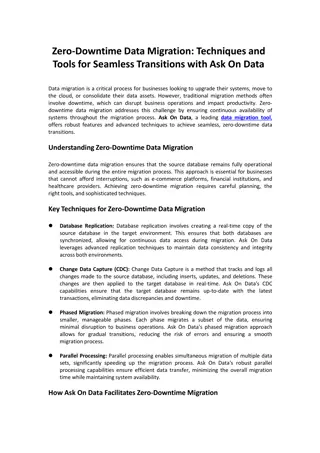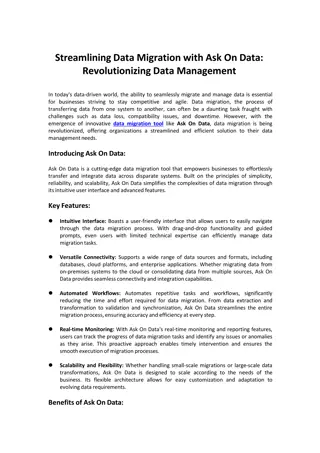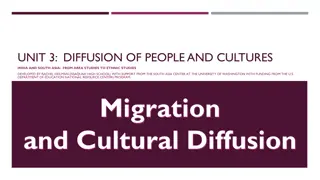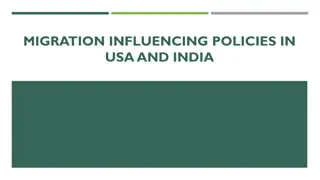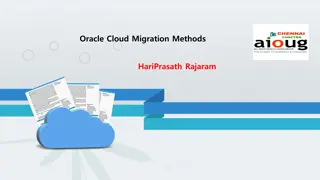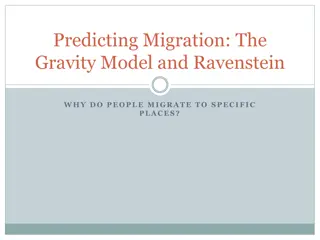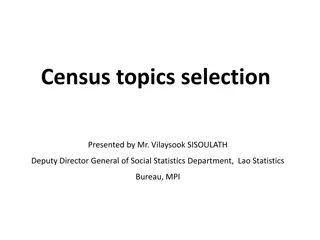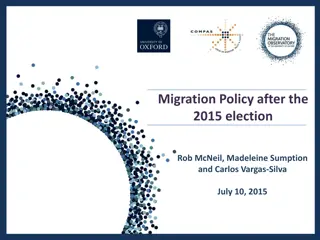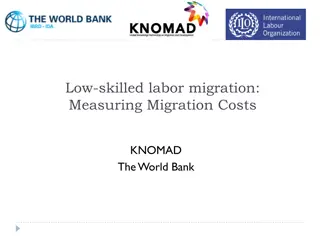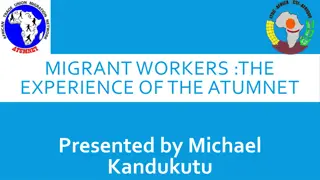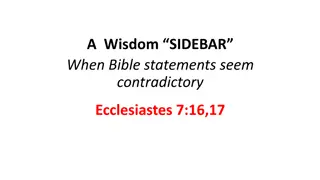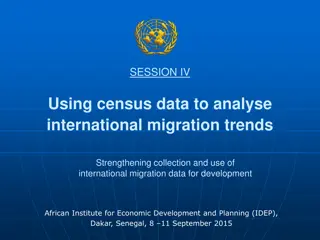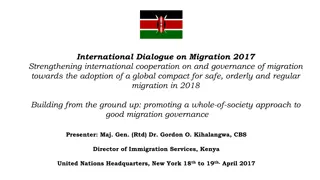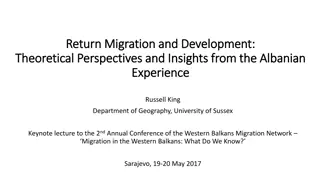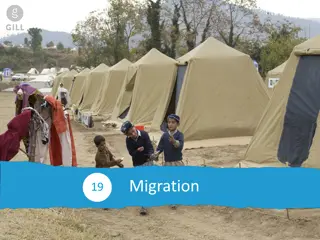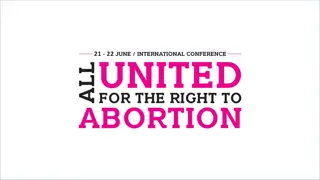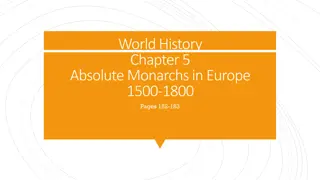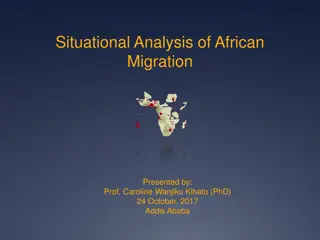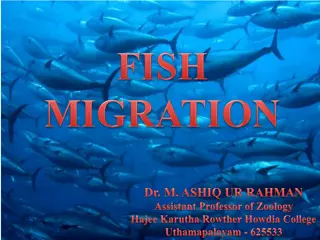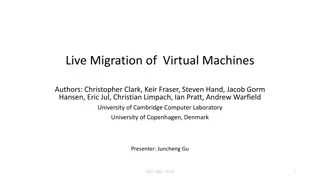Migration in Spain: Understanding a Contradictory System
This research project delves into the migration regime in Spain, exploring perspectives of various actors within the system. It covers topics such as the historical context of migration in Spain, current migration policies, and the state of foreign populations in the country. The study sheds light on Spain's evolution from a country of emigration to one of immigration, alongside its approach to asylum applications and recognition rates. Overall, the analysis provides valuable insights into Spain's complex migration landscape.
- Migration in Spain
- Contradictory System
- Actors Perspectives
- Historical Migration
- Asylum Applications
Download Presentation

Please find below an Image/Link to download the presentation.
The content on the website is provided AS IS for your information and personal use only. It may not be sold, licensed, or shared on other websites without obtaining consent from the author. Download presentation by click this link. If you encounter any issues during the download, it is possible that the publisher has removed the file from their server.
E N D
Presentation Transcript
Optionalbereich MAREM| Prof. Dr. Ludger Pries / Anna Gansbergen Migration in Spain Understanding a Contradictory System Perspectives of different actors Amanda Bailey, Sophie Reimertz, Eva G nzel, Christoph Winkler 1
Optionalbereich MAREM| Prof. Dr. Ludger Pries / Anna Gansbergen Table of Content 1. Introduction: Migration Regime in Spain 1.1 Ceuta and Melilla- Crisis 2. Research Question 2.1 Perspectives of different actors 3. State of Art 4. Data 5. Research Results 6. Conclusion 7. References 2
Optionalbereich MAREM| Prof. Dr. Ludger Pries / Anna Gansbergen 1. Introduction Spain Facts Area: 504.782 km 17 autonomous communities, 2 autonomous cities (Ceuta and Melilla) Population: 46.609.652 (2013) Foreign Population: 5.118.112 (9,1 %) Unemployment rate: 25,6 % (2013) < 25 years of age: 54,4 % (2013) EU entry in 1986; Member of the Schengen area since 1991 Governing party: Partido popular (christian-conservative, economic- liberalistic) Prime minister: Mariano Rajoy Brey (since 11/2011) 3 MAREM-project | SPAIN | 1. Introduction Spain Facts | Bochum | Summer Semester 2014
Optionalbereich MAREM| Prof. Dr. Ludger Pries / Anna Gansbergen 1. Introduction Migration History Spain traditionally rather a country of emigration 1905-1913: 1.5 million Spaniards emigrated to South American countries 1960-1975: 2 million Spaniards migrated to more prosperous European countries 1962-1979: 1,5 million emigrants returned to Spain for retirement Change into a country of immigration 1975: approximately 200.000 resident foreigners in Spain 1999: foreign population reached 1 million 2013: 5.118.112 resident foreigners Asylum applications claimed in 2013 4.500 applications (increase of 74% related to 2012) 2.365 asylum decisions; 535 positive; 1.835 rejected (77%) Top-countries of origin: Mali, Syria, Algeria, Nigeria, Somalia MAREM-project | SPAIN | 1. Introduction Migration History | Bochum | Summer Semester 2014 4
Optionalbereich MAREM| Prof. Dr. Ludger Pries / Anna Gansbergen 1. Introduction Migration Policy Migration policy exclusively handled at the central state level cooperation between: Ministry of Employment and Social Security Ministry of the Interior Ministry for Foreign Affairs and Cooperation Ministry of Justice coordination through: Deputy General Directorate for Legal Affairs Secretariat for Immigration and Emigration generally Spain shows up a liberal attitude towards migrants and refugees due to own migration experiences no anti-migration right wing parties nevertheless low rates of asylum applications and asylum recognition 5 MAREM-project | SPAIN | 1. Introduction Migration Policy | Bochum | Summer Semester 2014
Optionalbereich MAREM| Prof. Dr. Ludger Pries / Anna Gansbergen 1. Introduction Law and Asylum procedures rights of asylum seekers and migrants defined by the Spanish constitution 2 basic laws: Organic Law 2/2009 (Immigration Law) Law 12/2009 (Asylum Law) reformed for compatibility with EU-legislation complemented by Regulations and Royal Decrees lacking regulations for Asylum law complicate interpretation all asylum applications are exclusively treated by the asylum and refugee office (OAR) assistance of a joint-interministerial commission participation of UNHCR-Delegates (right on information, provide own opinion) application process can last 6 month up to 2-3 years or even more if application is accepted the autonomous communities of Spain are responsible for the assistance of integration 6 MAREM-project | SPAIN | 1. Introduction Law and Asylum procedures | Bochum | Summer Semester 2014
Optionalbereich MAREM| Prof. Dr. Ludger Pries / Anna Gansbergen 1. Introduction Law and Asylum procedures 7 MAREM-project | SPAIN | 1. Introduction Law and Asylum procedures | Bochum | Summer Semester 2014
Optionalbereich MAREM| Prof. Dr. Ludger Pries / Anna Gansbergen 1.1 Ceuta and Melilla Asylum Crisis Facts about Ceuta and Melilla - Spanish exclaves of Ceuta & Melilla: in a political sense part of Europe, geographically part of Africa. They are not part of Schengen. - Ceuta is only about 20 kilometers (12.4 miles) off the southern tip of Spanish mainland. - At Borders: 30,000 People await opportunity to enter EU. Migrants regularly attempt to scale fences separating Ceuta & Melilla from Morocco. => High-tech-fence: Three rows of six-meter-high (about 20 feet) barbed-wire fencing protect these Spanish frontline cities. Infrared cameras monitor the fortifications and motion and noise detectors have been installed. (Cost: 30 million) - Together with Airport Barajas, Ceuta & Melilla are principle points of entry to Spain 8 MAREM-project | SPAIN | 1.1 Introduction Ceuta & Melilla | Bochum | Summer Semester 2014
Optionalbereich MAREM| Prof. Dr. Ludger Pries / Anna Gansbergen 1.1 Ceuta and Melilla Asylum Crisis -In 2013, over 4,300 people entered the two enclaves irregularly -In Nov. 2013, Spain reinstalled barbed wire on the fence surrounding Melilla. (Had been removed in 2007, though it has been atop Ceuta fences since 2005.) -> On March 18, 2014, some 500 migrants managed to climb over the fences at Melilla in the largest successful attempt in recent years. -In reaction to recent events, Spanish government is planing to lawfully enable police officers to push back arriving groups and to further advance the fence technology. [ELPA S, March 2014] 9 MAREM-project | SPAIN | 1.1 Introduction Ceuta & Melilla | Bochum | Summer Semester 2014
Optionalbereich MAREM| Prof. Dr. Ludger Pries / Anna Gansbergen 1.1 Ceuta and Melilla Asylum Crisis Due to repeated violence towards expelled asylum seekers by Moroccan border guards, Human Rights Watch warns Spain: all forcible returns of sub-Saharan migrants to Morocco should be halted until Morocco can guarantee their humane treatment. Large scale attempts to climb over the fences at Ceuta and Melilla pose genuine security concerns, and Spain has a right to secure its borders. But these challenges do not absolve Spain of its duty to respect human rights, including the right to seek asylum and to protect migrants against inhuman treatment. Judith Sunderland, senior Western Europe researcher , welche Institution?#hier quelle 10 MAREM-project | SPAIN | 1.1 Introduction Ceuta & Melilla | Bochum | Summer Semester 2014
Optionalbereich MAREM| Prof. Dr. Ludger Pries / Anna Gansbergen 1.1 Ceuta and Melilla Asylum Crisis Life in Ceuta & Melilla: C.E.T.I.: Immigrants are held in the Centro de Estancia Temporal de Inmigrantes , the temporary holding center for immigrants. Living Conditions C.E.T.I.'s: covers basic needs for arriving until situation clarified -3 meals a day, medical treatment, psychological support & Spanish lessons. -rooms are shared and contain beds for 10 -The C.E.T.I. is an open access space nobody is forced to stay. -Impossible to find work in Ceuta or Melilla due to economic crisis -C.E.T.I. was designed to accommodate around 500 people for a temporary stay. In reality rooms are crowded & some immigrants stay years. #Aus red cross interv.: Zahlen zur berbelegung, evtl. auch woanders: wieviele tats chl dort 11 MAREM-project | SPAIN | 1.1 Introduction Ceuta & Melilla | Bochum | Summer Semester 2014
Optionalbereich MAREM| Prof. Dr. Ludger Pries / Anna Gansbergen 2. Research Question In a European comparison, many aspects of the Spanish asylum system seem to be exemplary, but on the other hand, the situation in Ceuta and Melilla is more than critical: How can we explain the contradiction between image of Spanish asylum policy and the reality of the Ceuta and Melilla crisis? Possible hypothesis/answers: 1. Spanish asylum policy is just window dressing (talk), meanwhile reality of treating with asylum and refugee issues (action) always was different and still contrasts. 2. There is a mutual blockade of different collective actors at the local, regional, national and European level of whom some try to make the Ceuta/Melilla defense system more effective and others intend to make it coincident . MAREM-project | SPAIN | 2. Research Question | Bochum | Summer Semester 2014 12
2.1 Perspectives of different actors Who are the different actors in the Spanish Asylum System? - governement [Ministries] - Police - governement-related Organizations - Grass-Root-Organizations (NGOs) - Religious Organizations Assumption: Every organization acts upon its own logic and is related/refers to different levels of action and legitimation: local, regional, national and European MAREM-project | SPAIN | 2.1 Perspectives of different actors| Bochum | Summer Semester 2014 13
2.2 Perspectives of different actors Common European Asylum System Spanish Asylum Law UNHCR, Cruz Roja Guardia Civil, Polic a Nacional FRONTEX Grass Root NGOss MAREM-project | SPAIN | 2.1 Perspectives of different actors| Bochum | Summer Semester 2014 14
3. State of the Art Algeciras Acoge: Monogr fico especial. Frontera sur europea: El mayor desnivel econ mico del mundo. Hist rica publicaci n de Algeciras Acoge en la que se recoge la situaci n de la frontera sur en los a os 2005- 2006. Una realidad y an lisis, que a os despu s sigue -por desgracia- absolutamente vigente. https://docs.google.com/file/d/0BzEEXM-xHBCIeklpN2lvV0hUNWs/edit CEAR: La situaci n de las personas refugiadas en Espa a Informe 2014 http://www.cear.es/wp-content/uploads/2013/05/Informe-CEAR-2014.pdf [http://www.cear.es/wp-content/uploads/2013/05/Resumen-Ejecutivo-Informe-2014-de- CEAR.pdf] Migreurop: En las fronteras de Europa. -Controles, confinamientos, expulsiones. Informe 2009-2010 https://docs.google.com/file/d/0BzEEXM-xHBCIY0lvaXRqRm5UTHVRRG5XY2JKQ0lTUQ/ edit?pli=1 MAREM-project | SPAIN | 3. State of the Art | Bochum | Summer Semester 2014 15
3. State of the Art APDHA' Annual Publicationes: Derechos Humanos en la Frontera Sur 2010-2013: -Balance Migratorio 2012 (Rafael Lara, P. 6-26) -El esc ndalo del paquete asilo (Catherine Teule, P. 27-32) -Mellilla, paradigma de unas inhumanas pol ticas migratorias (Patricia Simon, P. 64-71) -Seis anios despues de los acontecimimientos de Ceuta y Melilla: ?que pasa con el tratamiento de los subsaharianos y la pol tca de migraci n en Marruecos? (Julie Turco, P. 31-48) -Uni n europea: fronteras interiores y exteriores (Jacopo Corsini, P.49-65) -Ceuta y Melilla: el el limbo de los suenios (P. 59-72) MAREM-project | SPAIN | 3. State of the Art | Bochum | Summer Semester 2014 16
Optionalbereich MAREM| Prof. Dr. Ludger Pries / Anna Gansbergen 4. Data- Interviews in Spain No. Organization Characteristics Norms/ values/ Responsibilitie s Field of Legitimation Dominant Issue 1 2 3 4 5 6 ACCEM Acoge Algeciras APDHA Andaluc Acoge CEAR CEAR (Psycologist) Grass Root NGOs Support (legal, financial/econo -mical, social) National Regional Regional Regional National National A&R A&R A&R A&R A&R A&R 7 8 ACNUR Cruz Roja Government- related OGs Refugee relief Public welfare EU Global A&R multiple 9 10 Polic a Nacional Guardia Civil Official Executive actors Protection of the order in the state National National multiple multiple 11 Narrative Intrview with refugee from Cameroon 17 MAREM-project | SPAIN | 1. Introduction Spain Facts | Bochum | Summer Semester 2014
Optionalbereich MAREM| Prof. Dr. Ludger Pries / Anna Gansbergen 5. Research results Guardia Civil, Polic a Nacional FRONTEX Migraci n es un drama! Immigration is also a global issue that we all need to work on together in joint force. We all carry responsibility to this tragic topic. (Polic a Nacional in Spain) Two (contradictory) duties: a) Protecting refugees and asylum seekers and guaranteeing the right of applying for asylum b) Preventing the Spanish and therewith the European boarders of illegal mass immigration 18 MAREM-project | SPAIN | 5. Research results | Bochum | Summer Semester 2014
Optionalbereich MAREM| Prof. Dr. Ludger Pries / Anna Gansbergen 5. Research results Guardia Civil, Polic a Nacional FRONTEX Situation in Ceuta and Melilla: The Guardia Civil sees itself unable to cope with growing migration flows towards Ceuta and Melilla Reported illegal Push-Backs Requirement of support by other EU members (FRONTEX) 19 MAREM-project | SPAIN | 5. Research results | Bochum | Summer Semester 2014
Optionalbereich MAREM| Prof. Dr. Ludger Pries / Anna Gansbergen 5. Research Results [UNHCR & Cruz Roja:] Organizations associated with the federal government General Field of Work: -To offer help and assistance to asylum seekers & irregular migrants -To secure access to the asylum process for those who need it -To support government in decisions, give recommendations -To inform potential asylum candidates of their rights and chances -To work hand in hand with the government & all players involved -Awareness-Raising, Research, Publications 20 MAREM-project | SPAIN | 5. Research results | Bochum | Summer Semester 2014
Optionalbereich MAREM| Prof. Dr. Ludger Pries / Anna Gansbergen 5. Research Results Government-associated Organization Perspective, problems seen, critique: In respect to Ceuta and Melilla: Its the most unequal border in the world. [...] Although there is a primacy of protection of the coast/border, its not clear who can enter, who needs protection and on what basis this should be decided. How and where should the line be drawn? On what basis do we draw the distinctions of who needs protection? Europe has the responsibility to protect and to make asylum accessible. [...] We call for more and better trainings and preparation of policemen at the borders. They should be enabled to differentiate, to act appropiatley according to a situation and to know the legal aspect of different cases... 21 MAREM-project | SPAIN | 5. Research results | Bochum | Summer Semester 2014
Optionalbereich MAREM| Prof. Dr. Ludger Pries / Anna Gansbergen 5. Research Results We are worried about whats happening in Ceuta and Melilla, it s a cynical situation: On the one hand we speak about refugee and asylum rights, but what Europe and Spain are actually trying to do, is to restrict and retain immigration. This is against the international and European law and against our Law for Foreigners and Asylum. We have to respect human rights. We have to establish European laws which respect human rights. In the context of the economic crisis, of populism, xenophobia, and of racism; we need a European answer and democratic concept. 22 MAREM-project | SPAIN | 5. Research results | Bochum | Summer Semester 2014
Optionalbereich MAREM| Prof. Dr. Ludger Pries / Anna Gansbergen 5. Research Results Government-associated Organization Perspective, problems seen, critique: about NGO's in Spain: In comparison to other countries Spain has a relatively small presence of NGOs defending the right of asylum for applicants - The Majority of NGO's only functions through public and private funding. Basically, jobs and work that are steady are those of governmental institutions. NGO's work is always dependent on their instable financial situation. => The governmental centers are better centers. In general. With better service and stability. People who work there have a regular and stable budget. They work with more consistency, higher stability and reliability. -Positive about NGOs: Smaller, more personal, more flexible. Able to detect and care for special situations and needs better, often more continuously. (In specific cases, the NGOs are more adequate.) [All Quotes for this slide taken from S008] 23 MAREM-project | SPAIN | 5. Research results | Bochum | Summer Semester 2014
Optionalbereich MAREM| Prof. Dr. Ludger Pries / Anna Gansbergen 5. Research Results the system of fences in Ceuta and Melilla currently has the effect that only those who can climb the fences have the opportunity of entering. Mechanism have to be considered so that people can be identified and to work against this natural selection happening now. The topic is being discussed in the media. But nobody is tackling the issue of international protection and the necessities of the people concerned. In the case of having to return people to their country of origin, the legislation has to be followed. This has to be conform with the Spanish law for foreigners, which establishes some mechanisms/[safety] guarantees for returning people to their countries. The politics [in Ceuta and Melilla] are worrisome. Asylum eligible people won't apply for asylum in the centers designated for this because they know they would be stuck in these cities for an undefined amount of time while the others make it to the Spanish peninsula bit by bit. Once they reach the peninsula they can go to other countries or apply for asylum in Spain. This is interesting to keep in mind because it changes the panorama [big picture] of the protection/asylum system in Spain. [Quotes from: S008] 24 MAREM-project | SPAIN | 5. Research results | Bochum | Summer Semester 2014
Optionalbereich MAREM| Prof. Dr. Ludger Pries / Anna Gansbergen 5. Research Results Grass Root Organisations Accem, Acoge, Cear etc. Position: Help, awareness raising, Blaming/Shaming the situation for applicants is getting worse Perspective: Critique of the status quo lCritique of centralized asylum system in Spain lCritique of Detention Policy in Spain Critique of policy Ceuta/Melilla 25 MAREM-project | SPAIN | 5. Research results | Bochum | Summer Semester 2014
Optionalbereich MAREM| Prof. Dr. Ludger Pries / Anna Gansbergen 5. Research Results Grass Root Organisations Accem, Acoge, Cear etc. Chances: We need more flexibility More flexible asylum system Better opportunities for immigrants to get stay permits Shorter time frame and simplification of asylum procedure Efficient and short collaboration btw. the European States 26 MAREM-project | SPAIN | 5. Research results | Bochum | Summer Semester 2014
Optionalbereich MAREM| Prof. Dr. Ludger Pries / Anna Gansbergen 6. Conclusion NGOs, Government-related OGs and executive authorities differ in their perceived responsibilities etc##hier wieder explizier auf thesen von vorn Folie 12 beziehen## within the Spanish Asylum system: NGOs accuse executive authorities of violating human rights and shutting down the boarders NGOs are accused of being inefficient as they have less impact on decision- making processes ______________________________________________________________________ Consensus about actual situation in Ceuta and Melilla: Spain is unable to cope with the great rush of migrants at the Spanish enclaves Enhanced support by other EU members is indispensable The asylum system (in Ceuta and Melilla) does not work efficiently Decentralization of the asylum procedure and a simplified application process is needed 27 MAREM-project | SPAIN | 6. Conclusion | Bochum | Summer Semester 2014
Optionalbereich MAREM| Prof. Dr. Ludger Pries / Anna Gansbergen 7. References Interviews S002 CEAR_Sevilla_07.03.2014 S003 CEAR (Psy.)_Sevilla_13.03.2014 S004 Acoge Andaluc a Algeciras_Algeciras_11.03.2014 S007 Cruz Roja_Madrid_03.03.2014 S008 ACNUR_Madrid_03.03.2014 S010 Polic a Nacional_Tarifa_11.03.2014 S011 Acoge Andaluc a Sevilla_Sevilla_03.03.2014 MAREM-project | SPAIN | 7. References| Bochum | Summer Semester 2014 28
Optionalbereich MAREM| Prof. Dr. Ludger Pries / Anna Gansbergen 7. References Instituto Nacional de Estadistica (2013): Cifras de Poblaci n a 1 de julio de 2013. Online: http://www.ine.es/prensa/np822.pdf , checked 18.06.2014. UNHCR (2013): Asylum Trends 2013 Levels and Trends in industrialized countries. Online: http://www.unhcr.org/5329b15a9.html , checked 18.06.2014. Unemploymentrate Online: http://www.datosmacro.com/paro/espana?dr=2014-03 , checked 18.06.2014. European Commission (2012): Country Factsheet: Spain 2012. Online: http://extranjeros.empleo.gob.es/es/redeuropeamigracion/Informe_Anual_Politicas_Inmigracion_Asilo/countr y_factsheet_spain_2012_en_400004.pdf , checked 19.06.2014. EDAL (2014): EDAL Country Overview Spain. Online: http://www.asylumlawdatabase.eu/en/content/edal-country-overview-spain, checked 22.06.2014. Kreienbrink, A. (2010): Spanien Vom Auswanderungs- zum Einwanderungsland. Online: http://www.bpb.de/gesellschaft/migration/laenderprofile/57893/migrationsgeschichte , checked 19.06.2014 MAREM-project | SPAIN | 7. References| Bochum | Summer Semester 2014 29
Optionalbereich MAREM| Prof. Dr. Ludger Pries / Anna Gansbergen 7. References Derechos humanos en la frontera sur 2013. APDHA El ministro annuncia mallas antitrepa para las fronteras de Ceuta y Melilla. EL PA S, 6. de Marzo de 2014 Interior presenta como cuesti n de Estado la crisis de Ceuta y Melilla. EL PA S, 7. de Marzo de 2014 http://www.zeit.de/gesellschaft/zeitgeschehen/2014-02/Fluechtlinge-marokko-spanien-ceuta- melilla Zeit-Artikel vom 17. Februar 2014 http://www.migreurop.org/article2481.html?lang=fr26 f vrier 2014 http://www.migreurop.org/article1241.html?lang=fr(Trad. du fran ais, Jessica Edwards), Migreurop, 12 octobre 2005 Report: Spain: Accountability urged for appalling migrant deaths in Ceuta. Amnesty International (14.02.2014) Online http://www.amnesty.org/en/news/spain-accountability-urged-appalling-migrant-deaths- ceuta-2014-02-14, checked: 24.06.2014 MAREM-project | SPAIN | 7. References| Bochum | Summer Semester 2014 30
Optionalbereich MAREM| Prof. Dr. Ludger Pries / Anna Gansbergen Thank you for your kind attention ! The Spain-Group Amanda Bailey Eva G nzel Sophie Reimertz Christoph Winkler 31




